Things You Never Knew You Could Tow
February 23, 2023
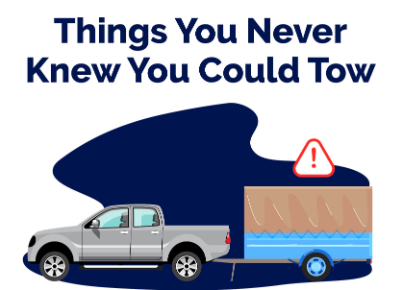

I am a serial entrepreneur and a consumer advocate. When I’m not helping car buyers, I love working on ventures that have a positive impact.
I run a cause marketing agency and serve on the board of Vayu Global Health where we are disrupting the medical industry and preventing the needless deaths of mothers and babies during childbirth.
You may not have known it, but you can tow a lot more than just the typical trailer or recreational vehicle. From boats and watercrafts to classic cars and construction equipment, there are many things that you never knew you could tow. You can even tow lawn furniture, trees and so much more.
Uncover the hidden possibilities for your next car-towing adventure!
Table of Contents
Boats and Watercrafts
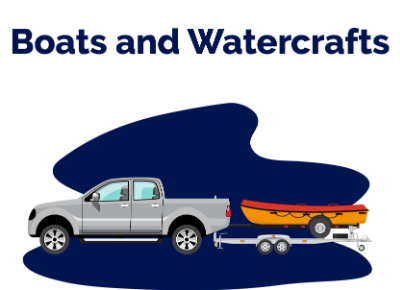 There are many types of boats and watercraft that can be towed, including motorboats, sailboats, kayaks, canoes, jet skis, and pontoon boats.
There are many types of boats and watercraft that can be towed, including motorboats, sailboats, kayaks, canoes, jet skis, and pontoon boats.
- Motorboats come in a variety of sizes and styles, such as fishing boats, speedboats, cruisers, cabin cruisers, bowriders, and more.
- Sailboats range from small dinghies to large yachts with multiple sails.
- Kayaks are typically smaller than other types of watercraft but offer great maneuverability for exploring rivers or lakes.
- Canoes provide stability on the water while allowing you to cover long distances quickly if desired.
- Jet skis are designed for speed and agility on the open waters, while pontoon boats offer a stable platform for leisurely cruising around your favorite lake or river spot.
For larger vessels such as motorboats, an appropriate trailer hitch system is required in order to ensure safe transport when driving down public roads.
Additionally, safety chains must be securely connected between both vehicles for added stability and security during the journey.
Smaller vessels like kayaks or canoes may not require any additional equipment beyond what is already installed on your vehicle; however, it is important to check with local regulations before transporting these types of watercraft on public roadways.
Key Takeaway: It is possible to tow many types of boats and watercrafts, such as motorboats, sailboats, kayaks, canoes, jet skis and pontoon boats. To ensure safe transport when driving down public roads an appropriate trailer hitch system is required along with safety chains connected between both vehicles. It's also important to check local regulations before transporting smaller vessels on public roadways.
Tiny Homes and Mobile Cabins
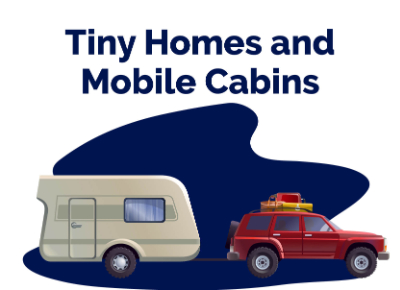 Travel trailers come in a variety of sizes, from small single-axle models to large triple-axle models with multiple slide-outs.
Travel trailers come in a variety of sizes, from small single-axle models to large triple-axle models with multiple slide-outs.
- Fifth-wheel trailers are larger than travel trailers and typically require a special hitch in the bed of a pickup truck or SUV for towing.
- Pop-up campers fold down into a compact size when not in use but expand into full living quarters when set up at your destination.
- Truck campers fit directly onto the bed of most pickup trucks, while toy haulers have an additional garage area for storing recreational vehicles such as ATVs or motorcycles.
- Teardrop trailer is another type of tiny home that is designed like an aerodynamic teardrop shape which makes it easier to tow behind smaller vehicles such as cars or SUVs.
Before setting out on your journey, you should check with local laws regarding weight limits on roads since some states may have different regulations than others depending upon where you live and plan to travel.
Key Takeaway: When towing a tiny home or mobile cabin, it is important to check with local laws regarding weight limits on roads and consider investing in auxiliary fuel tanks for longer trips. Types of towable homes include travel trailers, fifth-wheel trailers, pop-up campers, truck campers, toy haulers and teardrop trailers.
Classic Cars and Vintage Vehicles
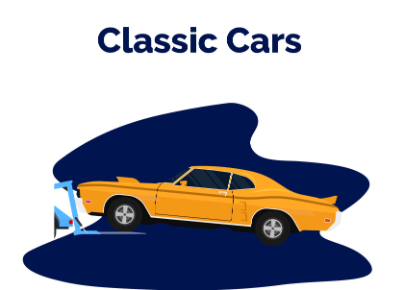 Classic cars and vintage vehicles are a great way to experience the nostalgia of days gone by. These vehicles come in all shapes, sizes, and styles, from classic muscle cars to luxury sedans.
Classic cars and vintage vehicles are a great way to experience the nostalgia of days gone by. These vehicles come in all shapes, sizes, and styles, from classic muscle cars to luxury sedans.
When towing classic cars or vintage vehicles, certain requirements must be met in order for them to be safely towed without causing any damage or harm.
The most important factor is making sure that the tow hitch is rated appropriately for your vehicle's weight and that the trailer has brakes capable of stopping the load when necessary.
Additionally, you should always check with local laws regarding proper lighting requirements on trailers when transporting these types of vehicles across state lines; some states may require additional lights, such as side markers or brake lights on both sides of the trailer, depending on where you live.
Key Takeaway: When towing classic cars or vintage vehicles, it's important to ensure that the tow hitch is rated appropriately for your vehicle's weight and that the trailer has brakes capable of stopping the load. Additionally, check with local laws regarding proper lighting requirements on trailers when transporting these types of vehicles across state lines.
Construction Equipment and Heavy Machinery
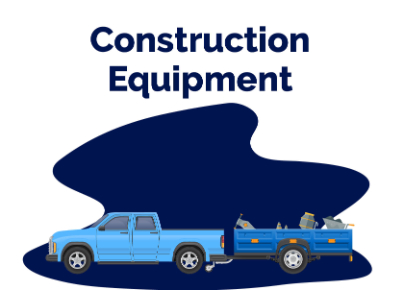 Construction equipment and heavy machinery are vehicles used in construction, agriculture, mining, forestry, and other industries. Examples include bulldozers, excavators, cranes, backhoes, skid steers, loaders (wheel or track), forklifts (diesel or electric), dump trucks (articulated or rigid frame), graders/scrapers/trenchers/plows/rippers.
Construction equipment and heavy machinery are vehicles used in construction, agriculture, mining, forestry, and other industries. Examples include bulldozers, excavators, cranes, backhoes, skid steers, loaders (wheel or track), forklifts (diesel or electric), dump trucks (articulated or rigid frame), graders/scrapers/trenchers/plows/rippers.
These machines can be powered by gasoline engines or diesel engines, depending on the type of machine being used.
Towing Requirements for Construction Equipment and Heavy Machinery
When towing construction equipment and heavy machinery, it is important to make sure that the vehicle being towed meets all applicable laws regarding size limits for trailers as well as weight restrictions for both the trailer itself and its contents.
It is also important to ensure that the tow vehicle has sufficient power to safely pull the load without overloading either itself or its brakes.
Additionally, any special safety features such as chains should be utilized when necessary in order to prevent accidents while on the roadways with these large loads.
Last but not least, make sure you read about special driving techniques when hauling something behind you as that will help you feel safer on the road.
Key Takeaway: When towing construction equipment and heavy machinery, it is important to check the size and weight restrictions of the trailer, make sure that the tow vehicle has enough power, and use safety features like chains.
Best Car Deals by Category
Frequently Asked Questions
What should you not do when towing?
Firstly, do not exceed the maximum recommended speed for your tow vehicle or trailer. Secondly, avoid sudden stops and starts as this can cause damage to both vehicles. Thirdly, never overload either vehicle beyond its capacity, as this could result in an accident or breakdown. Finally, make sure that all necessary safety equipment, such as brakes and lights are functioning properly before beginning any journey.
What can tow 3,500 lbs?
Depending on your budget and needs, you may want to consider a full-size pickup truck such as the Ford F-150 or Chevrolet Silverado 1500. Both of these vehicles offer powerful engines and strong frames that make them capable of towing up to 12,000 lbs when properly equipped. If you're looking for something smaller but still able to handle the job, an SUV like the Jeep Grand Cherokee or Toyota 4Runner could be a good choice. These vehicles have V6 engines and all-wheel drive capabilities that allow them to pull up to 7,200 lbs with ease.
How do I know what I can tow?
Towing capacity is an important factor to consider when buying a car. It can be determined by looking at the vehicle's Gross Vehicle Weight Rating (GVWR) and subtracting its curb weight. The GVWR can usually be found in the owner’s manual or on a label inside the driver-side door.
What can tow 4,000 lbs?
If you're looking for a vehicle that can tow up to 4,000 lbs, there are several great options available. The Ford F-150 is an excellent choice; it has a maximum towing capacity of 13,200 lbs and can easily handle the weight you need. Other good choices include the Chevrolet Silverado 1500, Ram 1500, GMC Sierra 1500, Toyota Tundra, and Nissan Titan. All of these vehicles have powerful engines and plenty of features designed specifically for hauling heavy loads.
Posted in Uncategorized |




